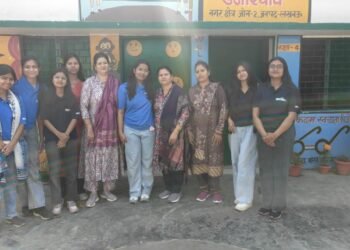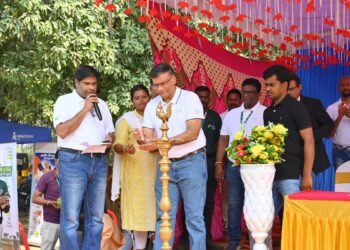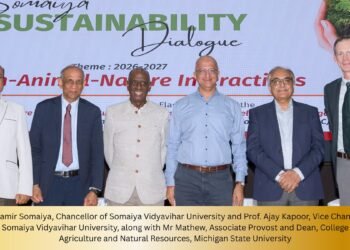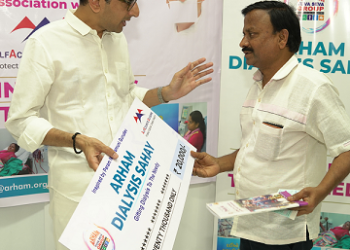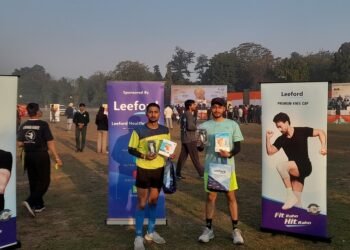MoU signed with Health & ICDS Departments to provide training and mentoring support to frontline healthcare workers, enhancing maternal and child health outcomes in rural communities.
BHARUCH, Gujarat (India CSR): DCM Shriram Foundation has announced the expansion of its flagship Khushali Sehat – Mother & Child Health Program in the Jhagadia block of Bharuch district, Gujarat. The expansion is set to improve health outcomes in the region through a Memorandum of Understanding (MoU) signed between the foundation, the Health Department, and ICDS (Integrated Child Development Services). The initiative will cover critical training and mentoring support for over 400 frontline healthcare workers, including Anganwadi Workers, Auxiliary Nurse Midwives, and ASHA workers.
Strengthening Rural Healthcare Systems
The expansion of the Khushali Sehat program marks a significant step in DCM Shriram Foundation’s efforts to address maternal and infant mortality in rural Gujarat. The MoU, signed in the presence of Shri Yogesh Kapase, IAS, District Development Officer (DDO) of Bharuch, and other key officials, aims to provide training to 214 Anganwadi Workers, 51 Auxiliary Nurse Midwives, and 181 ASHA workers in the Jhagadia block.
The foundation’s commitment to corporate social responsibility aligns with India’s National Health Mission (NHM), focusing on building the skills and knowledge of frontline workers to ensure better healthcare outcomes. The initiative will strengthen the region’s healthcare infrastructure by empowering these workers with the right tools and knowledge to deliver high-quality care at the grassroots level.
The expansion of the Khushali Sehat program in Gujarat is a crucial step in addressing the pressing healthcare needs of rural mothers and children.
Empowering Frontline Workers for Healthier Communities
The training and mentoring support provided under the Khushali Sehat program will equip frontline healthcare workers to better manage critical health issues concerning mothers and children. These workers play a vital role in healthcare delivery in rural areas, where access to formal healthcare facilities can be limited. Through this expansion, DCM Shriram Foundation aims to foster a healthier and more resilient healthcare system in the region.
Frontline workers, who form the backbone of India’s rural health sector, will be trained by CHETNA, the program’s implementation partner. CHETNA will lead on-ground efforts, ensuring that workers are better prepared to address maternal and infant health challenges, and support efforts to reduce mortality rates.
Aligning with Broader Corporate Social Responsibility Goals
The Khushali Sehat program is a key component of DCM Shriram Foundation’s holistic approach to community development. Beyond healthcare, the foundation is also deeply invested in improving rural livelihoods through sanitation, education, and skill development. This healthcare initiative is part of the broader mission to enhance the quality of life in rural communities by addressing key social challenges.
Through its focused efforts in rural healthcare, sanitation, and education, DCM Shriram Foundation is leading the way in corporate social responsibility by driving social impact and creating sustainable solutions for India’s underserved populations.
The DCM Shriram Foundation
DCM Shriram Foundation is the philanthropic arm of DCM Shriram Ltd, dedicated to uplifting rural communities across India. The foundation works on two main focus areas: Water in Agriculture and Holistic Development of rural communities. Their projects aim to improve water use efficiency, promote agronomic advisory, and advocate for sustainable agricultural practices. In addition, the foundation runs healthcare, sanitation, education, and skill development programs to transform rural lives.
Through the Khushali Sehat initiative and other community-focused programs, DCM Shriram Foundation continues to lead social impact initiatives, contributing to India’s broader development goals by creating healthier, more empowered communities.
*****
DCM Shriram Strengthens CSR Initiatives to Uplift Rural Communities and Promote Sustainable Development
Focus on healthcare, education, livelihood, and water conservation drives tangible impact across India’s aspirational districts
DCM Shriram, a leading diversified company in India, continues to enhance its corporate social responsibility (CSR) efforts to bring long-term, tangible changes to communities surrounding its areas of operation. Aligned with national priorities and the Sustainable Development Goals (SDGs), DCM Shriram’s CSR programs focus on empowering rural communities, improving livelihoods, and promoting sustainable agricultural practices. Through the DCM Shriram Foundation, the company is working towards building more resilient and self-sustaining communities, with a focus on healthcare, education, and water conservation.
Comprehensive CSR Strategy Aligned with National Priorities
As part of its CSR mandate, DCM Shriram complies with Section 135 of the Companies Act, 2013, and Schedule VII, which requires companies to align their CSR initiatives with the needs of local communities. DCM Shriram’s CSR programs take an integrated approach to ensure holistic development, making a direct impact on quality of life while also addressing critical community needs.
Key CSR Projects Undertaken in Aspirational Districts
DCM Shriram has been actively involved in India’s aspirational districts, as identified by government bodies. In Uttar Pradesh’s Sonbhadra district, the company invested INR 30,00,000 in an agricultural skilling project aimed at empowering local farmers. The initiative aims to improve agricultural productivity and increase the economic resilience of the farming community through skill development and advanced farming techniques.
Major CSR Interventions and Beneficiaries
DCM Shriram’s CSR interventions have had a far-reaching impact across multiple sectors. The foundation has implemented various initiatives under the umbrella of Khushali Sehat, Khushali Shiksha, and Khushali Rozgaar, focusing on healthcare, education, and livelihood development.
Healthcare Initiatives:
- Khushali Sehat – Pregnant Women: 10,044 pregnant women received preventive healthcare.
- Khushali Sehat – Lactating Mothers: 4,315 lactating mothers benefitted from healthcare programs.
- Khushali Sehat – Adolescent Girls: 30,963 adolescent girls were covered under healthcare initiatives.
- Kishori Utkarsh Pahel: 9,314 adolescent girls were reached through this program, focused on health and empowerment.
Education Initiatives:
- Khushali Shiksha: 3,741 students benefitted from educational programs aimed at improving literacy and learning outcomes in rural areas.
Livelihood Initiatives:
- Khushali Rozgaar – Tailoring and Project Zardozi: 286 girls were trained in tailoring, with additional training in traditional embroidery through Project Zardozi.
- Khushali Rozgaar – Farmers Empowerment: 7,000 farmers benefitted from initiatives aimed at increasing agricultural mechanization and entrepreneurship.
- Digital Literacy and Repair Skills: 70 students were trained in mobile and laptop repair, while 15 students were trained in Dairy Cooperative Society (DCS) operations, enabling them to enter technical and rural industries.
Rural Development and Infrastructure:
- Cattle Development Program: 420 families benefitted from initiatives aimed at improving livestock productivity.
- Infrastructure Development: 10,000 individuals were reached through rural infrastructure improvements, including the construction of roads and streetlights.
Focus on Water Conservation and Agricultural Development
Water conservation remains at the heart of DCM Shriram’s CSR initiatives. Under the Krishi Udyam Pariyojana, 15,000 farmers were trained to become agricultural entrepreneurs, focusing on increased mechanization and allied agribusiness. The Upjau Mati Pariyojana initiative reached 18,400 farmers, providing them with tools to enhance soil health and promote composting at both the individual and community levels. These initiatives directly contribute to more sustainable and efficient agricultural practices, ensuring that farmers can thrive while conserving natural resources.
(India CSR)




